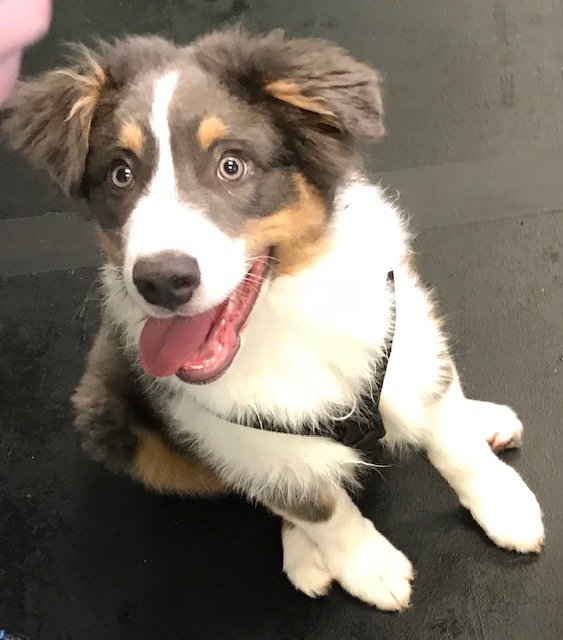Puppies
Preparing Your Puppy to Become an Adult Therapy Dog
One of our most frequently asked questions is how to train a puppy to become a therapy dog. We don’t train and certify puppies under 1 year of age as therapy dogs at this time, but we appreciate that becoming a therapy dog team at some point in your dog’s life might be a goal for you. We encourage you to think about raising and training your puppy to be the companion of your dreams. Slow down and enjoy this time in your dog’s life by providing lots of love, training, experiences, and play. If your puppy matures into a dog who enjoys therapy visits, great! If not, you have a wonderful friend for the life of your dog. It’s a win-win! That said, we have some specific advice if you’d like to become a team in the future.
Key Points
Unlike service dogs, being a therapy dog isn’t a set of skills that can be trained. Becoming a therapy dog has everything to do with a dog’s inherent temperament. If that inherent temperament is there, how you foster and support that potential become key.
It’s nearly impossible to tell at the puppy stage whether or not your dog will be able to become a therapy dog in the future. However, you can work with your dog to give it a solid base and maximize the possibility it can become a therapy dog.
The average age range of a therapy dog in our organization is 4–7 years old. It’s tough for dogs under 2 years of age to certify simply because they aren’t mentally and emotionally mature enough. That doesn’t mean it never happens, but the probability is lower than with older dogs. Puppies and adolescents really need time to play, develop and just be dogs. There is plenty of time for them to deal with the pressures and stresses of therapy dog support later when they are mature and ready to handle it.
Raising and Training a Well-Rounded Puppy
In order to become a successful therapy dog team, it’s essential that you build a strong, positive, trusting relationship with your dog, not one that’s based in fear. In all your endeavors with your puppy, please be sure to work force-free with positive reinforcement and choose trainers who follow these philosophies. Be sure your trainer doesn’t use choke, prong, or e-collars of any kind.
With that in mind, we recommend the following to all puppy owners:
Start attending puppy playtimes as soon as possible for positive dog-to-dog socialization.
Take multiple levels of puppy obedience classes. One basic class is not sufficient. While being a therapy dog is not a skill that can be trained, your puppy needs obedience skills and good manners to become a therapy dog. These basics are not offered through our therapy dog certification program. Our assumption is that your dog starts the program with this training already in place. If you are in Seattle, we recommend Great Dog for training. They have a great puppy program and many of their instructors/examiners work with Project Canine and know what we are looking for. They also have adolescent classes. Ahimsa in Seattle has good puppy training as well.
Learn as much as you can about adolescence in dogs. This is probably the toughest part of raising a puppy and most owners aren’t prepared.
Continue to find activities and training you and your dog can do together throughout adolescence. Most people focus on the puppy phase but adolescence lasts much longer, and persevering through this sometimes difficult stage is key to your dog’s success as an adult.
Expose your puppy to as many different people, locations, situations, circumstances, and unusual stimulations (skateboards, bicycles, motorcycles, razor scooters, etc.) early and often. It is essentially that you keep these experiences positive and safe for your puppy so that your dog does not become traumatized. Trauma can be hard to correct after it has happened. Go slow, use lots of treats and praise, make sure your puppy knows you are there for support and protection, and never force. It’s up to you to expose your puppy to the world with minimal stress and maximum positivity.
Downloads
Further Resources
We recommend materials from the following trainers. They all have websites, social media, etc. that has good information and there are links below to some of their puppy resources:
Blue Australian Shepherd as a puppy. He has grown up to become a certified therapy dog.

